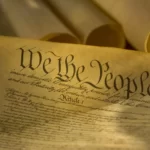Government, by definition, is a social monopoly of force. The immense power vested in police forces and armies worldwide rests in the hands of governments, granting them unparalleled potential to violate individual rights. Historically, some of the worst injustices—massive waste, confiscatory taxes, purposeless wars, great depressions, slavery, concentration camps, and genocide—stem from governmental actions, either directly or indirectly.
However, governments also fulfill essential societal needs. They provide water power and roadways, prevent fraudulent business practices, combat air pollution, quell riots, protect patents and copyrights, capture criminals, and defend citizens against foreign invaders. Yet, even while addressing these needs, governments almost invariably infringe upon the rights of their citizens. This begs the question: what differentiates the proper from the improper actions of governments?
The Morality of Government Actions
The principles that define what is proper or improper for governments are the same as those that apply to individuals. Despite their lofty pretensions, governments are merely collections of individuals. The “rights of a government,” like the rights of any other association of people, cannot morally differ from the rights of the individuals who comprise it. What is immoral for individuals is equally immoral for a group, regardless of the group’s size or authority.
A Tale of Theft: Individual, Gang, and Government
Consider a hypothetical scenario: A man demands a portion of another man’s income, claiming he knows better how to spend it. If the second man refuses, the first man takes it by force and eventually resorts to violence if resisted. Most would label the first man a thief and a murderer, while the second man would be seen as an innocent victim.
Now, suppose this lone criminal is part of a larger gang, the Mafia. If the Mafia robs the man in the same manner, their actions remain criminal, irrespective of the number of participants. Robbery and murder are wrong, whether committed by one person or many.
The Tax Collector Analogy
Finally, let’s replace the Mafia with a government entity, such as the Internal Revenue Service (IRS). The IRS agent, empowered by the government, demands money from the individual, claiming it is for “the poor.” The act of forcibly taking money from someone against their will, regardless of the intended use, remains theft. If the individual resists, the agent will seize the property, and force may escalate to violence.
The Core Ethical Principle
It does not matter whether the theft is sanctioned by an individual, a small gang, or a large government body. Taking someone’s property against their will is theft, irrespective of the beneficiaries. The moral rights of a government should be no different than those of the individuals comprising it.
This perspective highlights a critical ethical question about the role and actions of government. By holding governments to the same moral standards as individuals, we can better scrutinize the legitimacy of their actions, particularly concerning the use of force and property rights.
If an individual has an inalienable right to his own life, liberty, and property, then morally, his life and property are his to manage as he pleases. It is as immoral for a government to tax his earnings, regulate his business, or draft his sons as it would be for an isolated individual to do so on his own authority. The formation of a group called “government” does not absolve its members from moral responsibility or legitimize actions that would otherwise be immoral.
It is irrelevant whether the tax collector’s victim receives some of his property back in the form of roads, postal services, police protection, or other government services. When the government decides what is taken and what is given, the individual loses control over his own property. The return of the victim’s property as government services is not trade but theft.
In trade, exchanges occur by the mutual consent of all parties involved, each setting their own terms. In most taxation, property is taken without the owner’s consent, and services may be provided according to the government’s decrees. Therefore, taxation—the foundation of modern governments—can only be described as theft.





